
Reflect on all we achieved with your partnership.
This year has been a testament to the power of collective action and strategic advocacy. With every challenge, we have strengthened our commitment to building a movement that champions dignity and opportunity for all. The stakes are high, as our country continues to navigate pressing issues that threaten the rights of millions, especially people with low income and people of color.
Yet, 2023 has been a year of progress. At the Shriver Center on Poverty Law, our bold vision is a nation where everyone has equal access to opportunity and is given the chance to thrive. We know poverty is a policy choice — but we can make a better choice. Because of the support of our donors, grassroots leaders, and other partners for justice, we achieved significant wins in 2023:
– Advocated for Illinois to be the first state in the nation to eliminate cash bail
– Joined 21 other states to no longer allow landlords to deny housing to anyone based on their source of income
– Celebrated 10 years of our Racial Justice Institute, which equips advocates with the tools to tackle racial injustice at local and national levels
That’s why our work remains so crucial. The Shriver Center on Poverty Law has been at the forefront of economic justice advocacy. For nearly 60 years, we’ve fought for a nation free from poverty and racism, and pushed for progress through 11 presidential administrations.
There is a concerted effort to erase the history of economic oppression in the United States, particularly for people of color. But the truth is that poverty remains an urgent crisis. In Chicago alone, more than 450,000 people live below the poverty line — that’s one in seven of our neighbors, friends, and family members. And nationwide, nine million children, or 12 percent, live in poverty.
Systemic racism makes this worse. It’s embedded into our societal structure, and it’s intended to disenfranchise and destabilize communities of color. But ultimately, it comes as a cost to us all. Discriminatory policies have an astounding effect on the economy, reducing the collective wealth and income of all Americans
Despite these challenges, the core of our work remains unwavering: changing rules to change lives. We fight for and alongside people and communities that are and have been denied equal access to opportunity. We fight for everyone to have a safe, affordable home. We fight for solutions to lift working families out of poverty. We fight to keep families together whenever possible. And we continue to broaden our national network of advocates and organizations committed to ending racism and poverty.
We invite you to join us in imagining a new reality, where everyone can provide for themselves and their families, where all people have access to quality medical care, and where equal work earns equal pay — regardless of someone’s race or where they come from.
This is how you change rules to change lives. Smart, targeted investments can be transformational. And when we remove the highest barriers, everyone benefits.
This work is hard, and our victories are hard-won. But this past year shows that change is not only possible, but actively happening day after day. With you fueling this fight, we can champion policies that amplify the impact of our shared 2023 wins. We can build a nation that lives up to its highest ideals. We can invest in communities with the greatest need, whether urban, suburban, or rural. We can get people, families, and communities the resources they need.
As the changemakers who fuel our mission every day, your audacity, vision, and hope make better, more equitable outcomes possible. When we fight for justice together, everyone thrives. That’s a future worth fighting for.
With deep appreciation,


Audra Wilson
President & CEO
in 22 states no longer allow landlords to deny housing based on an individual’s source of income
Illinois is
in the nation to fully ban cash bail, a practice that punishes poverty
reduction in the jail population, since the courts upheld the law to eliminate cash bail

in the Legal Impact Network, spanning 34 states and Washington, D.C.
of the Racial Justice Institute
people trained in racial justice advocacy
As a nation, we share the belief that America should be a land of prosperity, where every individual has the chance to succeed and thrive. Unfortunately, access to opportunity is not equal or equitable.
At the Shriver Center on Poverty Law, we bring together advocates, partners, and coalitions to design laws and policies that support everyone.
Poverty is woven into the very fabric of our nation, with institutions, structures, and systems designed to disenfranchise millions of people, families, and communities. But we can make smarter, transformational policy changes. Together we can choose to change rules to change lives.
And because these systems were designed with race in mind, we approach solving poverty with a racial justice lens. The solutions require a holistic strategy because people don’t lead single-issue lives. Therefore, we focus on and collaborate across multiple systems and sectors affecting children and families.
Economic justice: We work to ensure children and families receive income supports to meet their needs and that people can get jobs with good wages and benefits.
Health justice: We fight to eliminate barriers to affordable, quality health care for people and families with low income, no matter their race, gender, or where they’re from.
Housing justice: We work to ensure people have access to quality housing, regardless of their source of income, arrest or criminal record, or eviction history.
Community and family justice: We advocate for policies that support parents, keep families together, and help people thrive in their communities.
Our work with our partners in these areas is a blueprint for innovative impact that can be shared with other communities. Litigation is one of our strategies to shape policy that provides justice for all. We also work locally and nationally to effect change by training and convening multi-state networks of public interest attorneys and other advocates.
Through our unique approach to advocacy, we are changing rules to change lives.
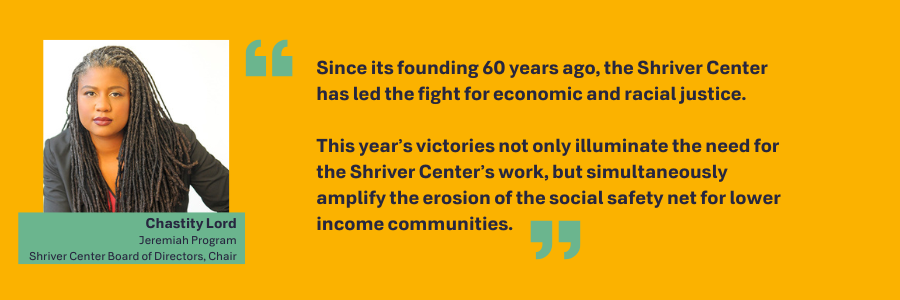

No one should have to choose between their well-being and their paycheck. Workers who are paid low wages and can least afford to miss work are also the least likely to have paid leave. Without paid time off, workers and their families face barriers to receiving necessary health care. They are more than three times as likely than those with paid sick days to go without medical care.
With our coalition partners, the Shriver Center helped pass in 2023 the Paid Leave for All Workers Act, which ensures that workers in Illinois are entitled to one hour of paid leave for every 40 hours worked. This can be used for any reason. The city of Chicago also passed the Paid Leave and Paid Sick Leave Ordinance, allowing up to 40 hours of paid leave each year.
The new law in Chicago is the largest expansion of paid time off in any city in the nation. By extending paid time off for all workers, Chicago is a national leader in economic justice. The Shriver Center will continue to fight for an economy that works for everyone — and that includes having a healthy work-life balance.
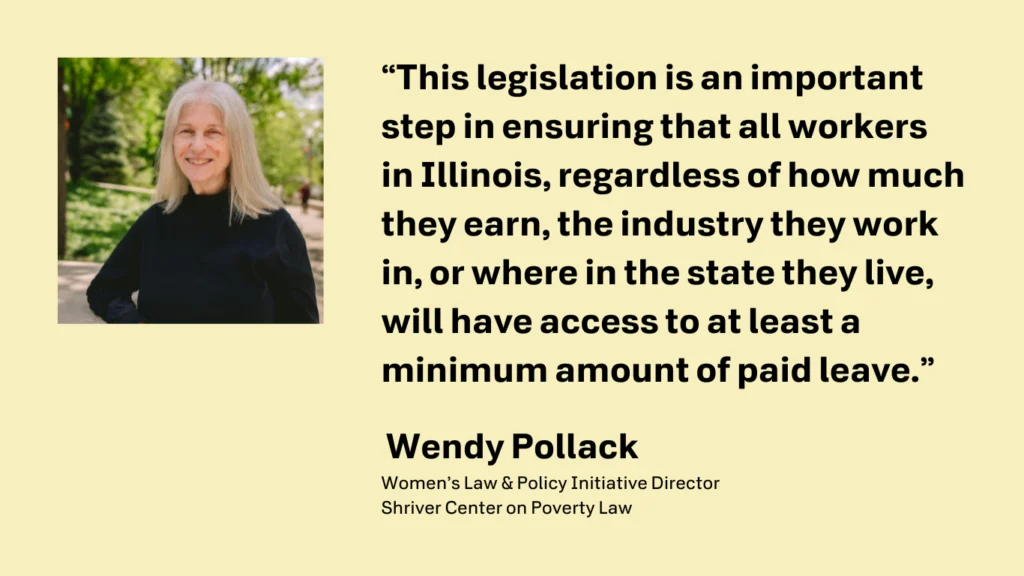

Illinois’ cash bail system unjustly punished people with low income, disproportionately impacting Black and brown communities. Thousands of residents were detained pretrial simply because they could not afford bail, disrupting their families, employment, and housing — all before having their day in court. This included people who were not deemed a threat to public safety.
The Shriver Center was instrumental in the implementation of Illinois’ Pretrial Fairness Act, a groundbreaking provision of the SAFE-T (Safety, Accountability, Fairness and Equity-Today) Act that eliminates cash bail. Through legal advocacy and coalition building, the Shriver Center helped move this historic reform forward, advocating for fairness in pretrial practices and educating communities about their rights.
With the end of cash bail in Illinois, thousands of people are no longer jailed simply for being unable to afford their freedom. This reform marks a significant victory in reducing racial disparities and promoting a fairer criminal legal system. As the first state to take this bold step, Illinois sets a precedent for the country.
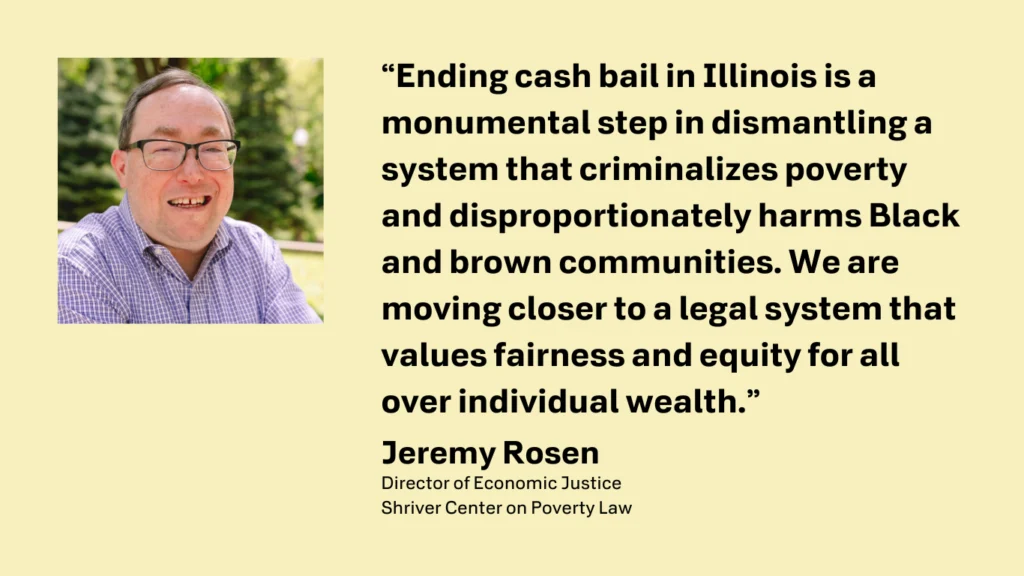

Everyone deserves high-quality, affordable health care, but many Americans continue to face barriers to coverage. In Illinois, residents fall through the cracks of our health care system when they no longer qualify for Medicaid or lose employer-based insurance. Others, like undocumented immigrants, are excluded from coverage under the Affordable Care Act, also known as Obamacare.
To make Illinois healthier, the Shriver Center helped win passage of a state-based health care exchange. The marketplace will allow the state to fill gaps in coverage and control skyrocketing costs. It will also give Illinois greater capacity to ensure people don’t go without health care when their employment or financial circumstances change.
Stephani Becker, associate director of healthcare justice for the Shriver Center, serves on a committee that advises Illinois policymakers on the exchange’s design and implementation, set to begin in 2025. As one of only two consumer advocates on the committee, she fights for everyday people who need quality, affordable health care.
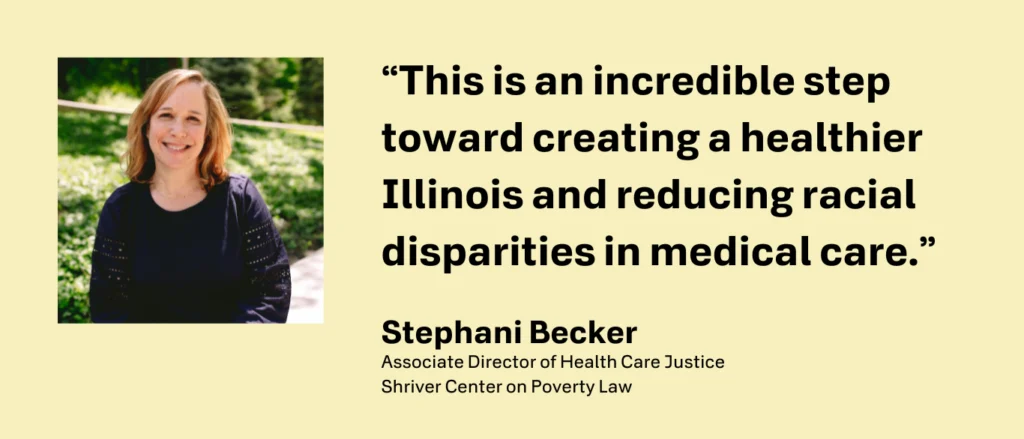
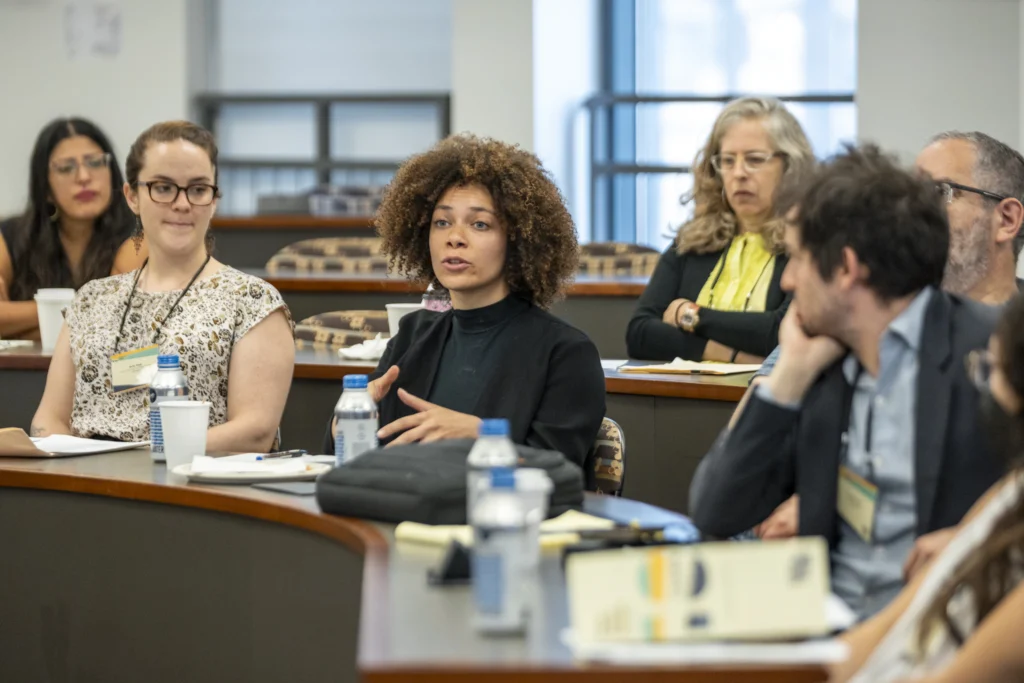
Systemic racism and economic inequality are embedded in frameworks such as the criminal legal system, housing policies, and social services. But the only way to combat systemic racism is to pursue a systemic solution. Systems change work requires advocates who are trained to analyze the problem with an awareness of the inequities and the methods needed for the greatest impact. There is a clear need for well-trained advocates with the reach of national networks to address these issues and combat white supremacy and racial injustice.
The Shriver Center has led the charge through two key initiatives: the Racial Justice Institute (RJI) and the Legal Impact Network (LIN). RJI equips advocates with the tools to tackle racial injustice at local and national levels, while LIN brings together state-based advocacy organizations to create coordinated strategies for systems change. In 2023, both initiatives convened in Chicago to celebrate RJI’s 10-year anniversary and to chart a bold path forward for future economic and racial justice work.
The combined efforts of RJI and LIN have created a dynamic national network of advocates working collaboratively to advance racial and economic justice. RJI has graduated over 318 fellows to lead transformative work in their communities, while LIN members have shared resources and best practices among fellow advocates across the nation. The Shriver Center will continue to leverage the strength of national networks and drive coordinated efforts to dismantle structural inequalities and improve the lives of marginalized people.
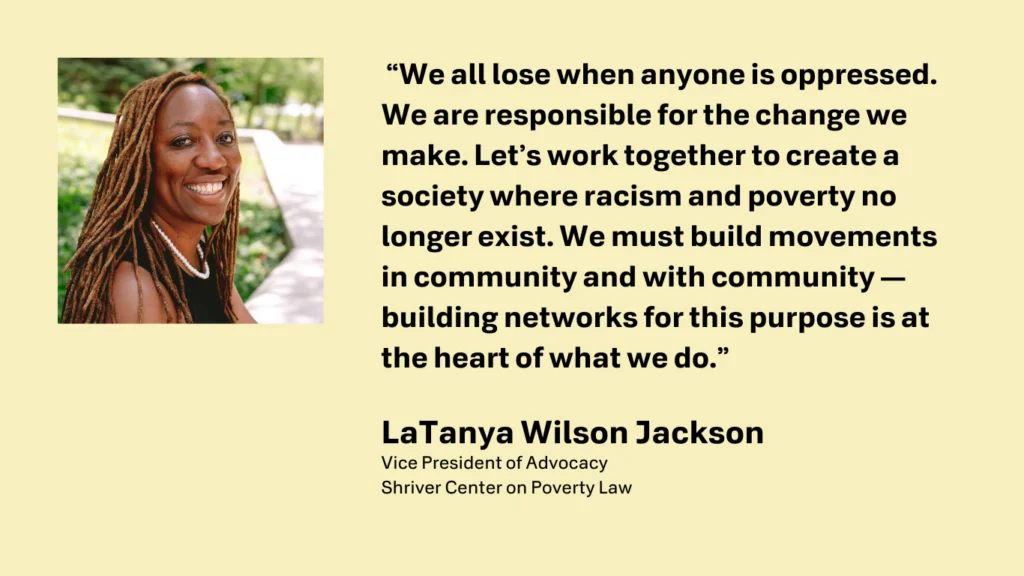
Together, we’ve strengthened movements, challenged unjust policies, and built momentum toward a more equitable future where everyone can thrive. In 2023, your investment enabled us to expand our reach and deepen our critical work to change rules that change lives.
Through our Civil Rights at a Crossroads series and Racial Justice Forum, we brought together advocates, leaders, and community voices from across the nation, empowering them with the knowledge and tools to drive real change. These conversations sparked new strategies for dismantling inequality with participants from 235 organizations and 34 states and Washington, D.C. leaving equipped to take action in their own communities.
Thanks to your continued support, 164 people elevated our Year End Appeal to raise upwards of $145,000 to propel our work into the year ahead. Every dollar raised directly contributes to reshaping policies, ensuring families and communities can thrive free from the barriers of racial injustice and poverty.
We hope that you take pride in our collective achievements and feel energized for what comes next! Over the next year, we will strengthen families and communities by fighting to reimagine the social safety net, advance workers’ rights, expand access to safe, affordable housing, and secure healthcare for all. Your investment fuels this fight for racial and economic justice, allowing our advocates to leverage decades of experience and impact to build a future worth fighting for.
With gratitude,


Erin Dowland Kabwe
Vice President of Development
With your partnership, the Shriver Center gathered advocates and worked in community to tackle racial and economic justice issues. Here’s a collection of photos from our events in 2023, including the Racial Justice Forum, a convening of the Legal Impact Network, and a celebration of the Racial Justice Institute’s 10th anniversary.

In 2023, we received funding for the first time from Charles and Lynn Schusterman Family Philanthropies to end housing discrimination against people with arrest and conviction histories nationwide. Like us, Schusterman Family Philanthropies believes in driving long-term, systemic change through strategic investments in leaders, organizations, and policies.
Because of their investment, the Shriver Center continues to co-lead the Partnership for Just Housing, a national coalition working to reduce barriers to safe, affordable housing for returning citizens.
We’re immensely grateful to Schusterman Family Philanthropies for their generous investment to advance federal- and state-level policies that create housing justice for returning citizens.
“Schusterman Family Philanthropies is fueling justice in Illinois and nationwide by supporting transformational policies. Their collaboration and commitment to racial and economic justice has helped to advance new federal housing guidelines, which will change the game for people with arrest and conviction histories. Together, we will work to ensure that America champions equity and opportunity for all.”
— LaTanya Jackson Wilson
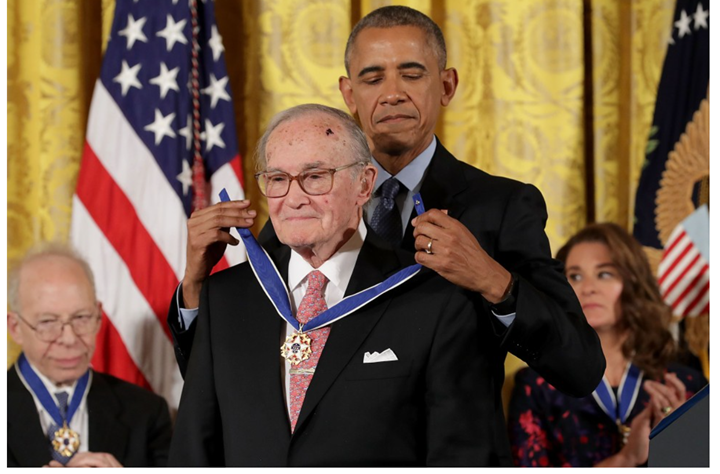
Newton Minow was a longtime friend and donor of the Shriver Center, whose leadership, service and commitment helped fuel the movement to end poverty nationwide. When he passed away in the spring of 2023, he left behind a legacy of justice, not only through his esteemed career and philanthropy, but also through making a planned gift to the Shriver Center. We are truly honored to carry on his name through our advocacy.
Of his many accomplishments, Minow brought presidential debates to the American people as FCC chairman, accelerating the democratic process by allowing voters the opportunity to see, hear, and evaluate presidential candidates in a new way. Voting, policy, and systems change are long processes, with progress sometimes taking decades of advocacy to achieve. Minow’s legacy reminds us to continue on — to make an impact on the world every single day.
“We honor our dear friend Newt and his family. Mr. Minow was a pioneer whose extraordinary life and legacy that continues to inspire us all. A contemporary and friend of Sargent Shriver, Newt was passionate about public interest law and a longtime supporter of the Shriver Center. He shared our vision for stronger communities built on justice and opportunity for all. We will miss him.”
— Audra Wilson, President and CEO
Thank you to our generous donors, funders, and supporters, who make our work for economic and racial justice possible.
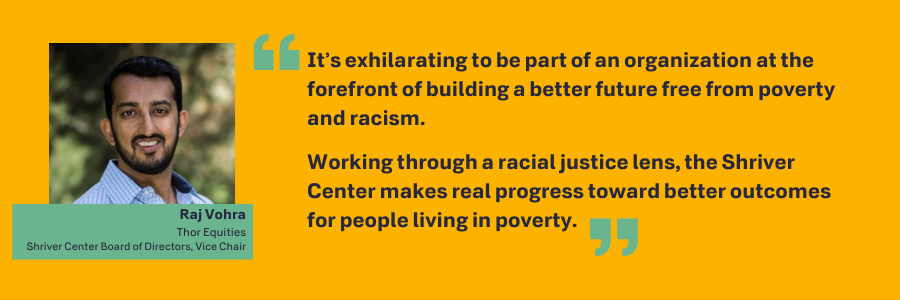
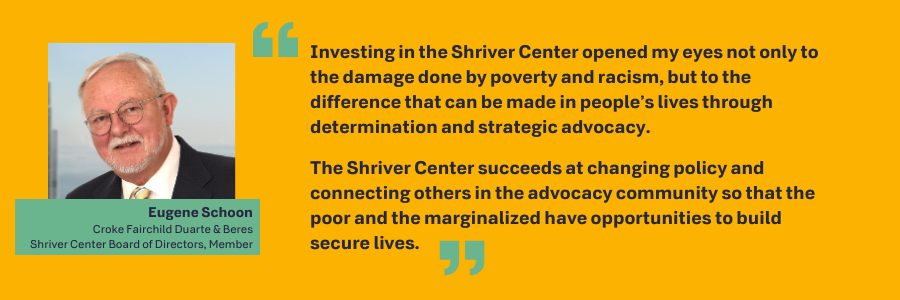
We believe in organizational excellence at all levels, grounded in our core values and measured against progress toward our mission to guide our path to success.
Below is a snapshot of the Shriver Center’s revenue and expenses for fiscal year 2023. Our Audited Financial Statement and tax form 990 are available for download.
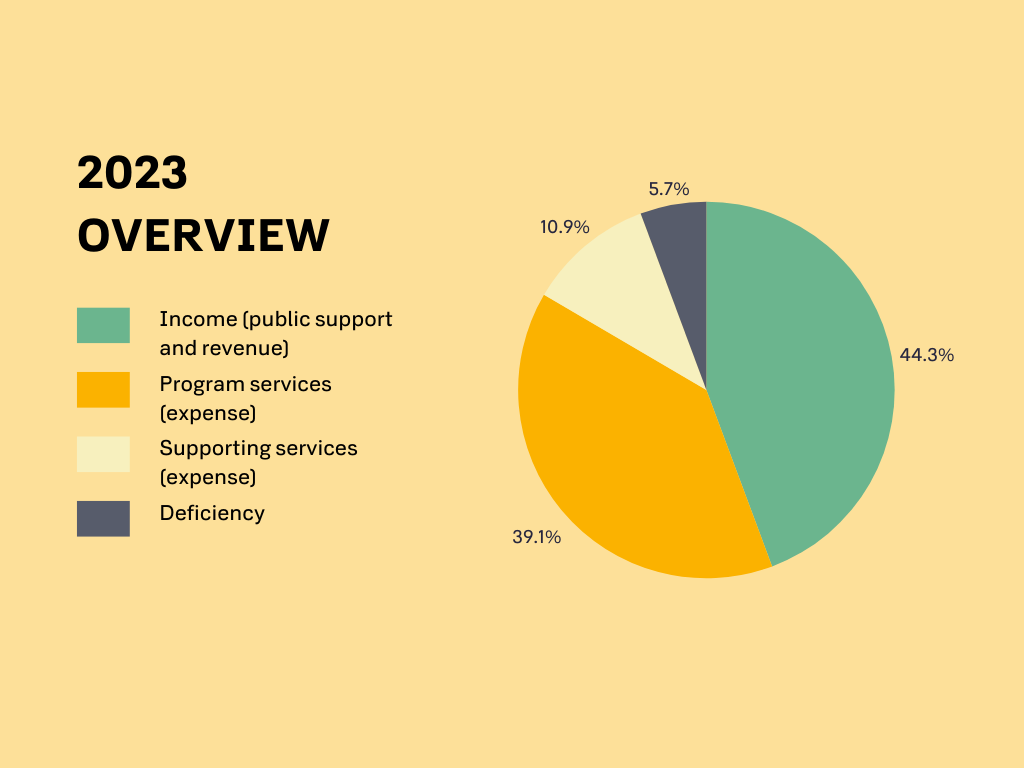
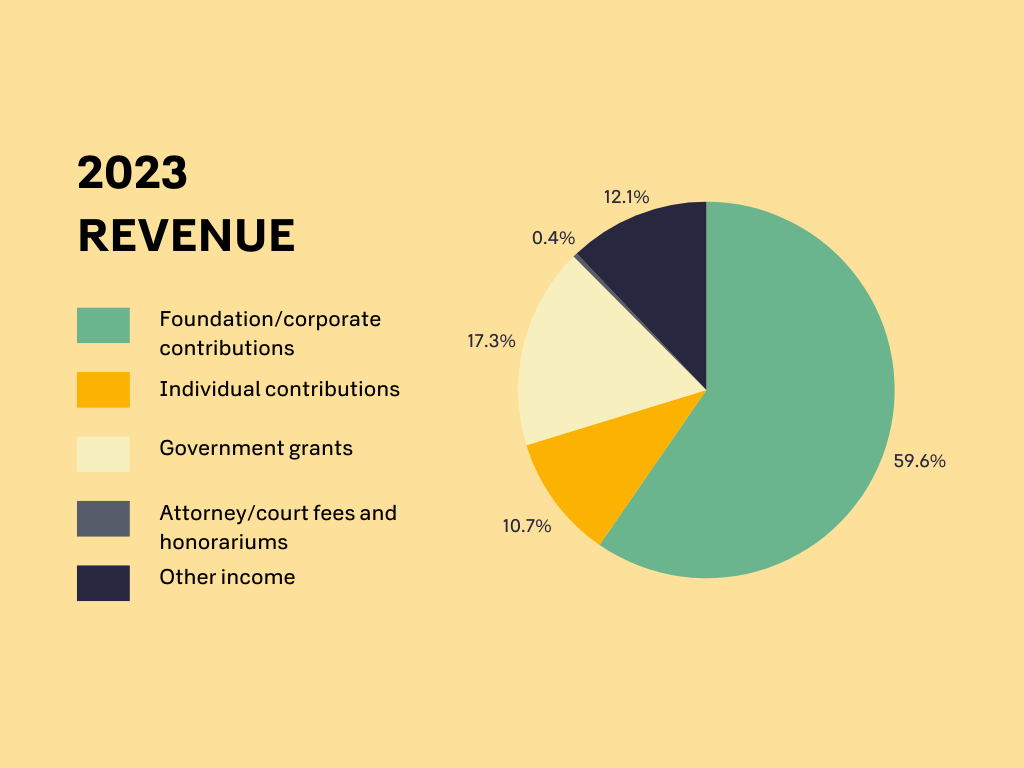
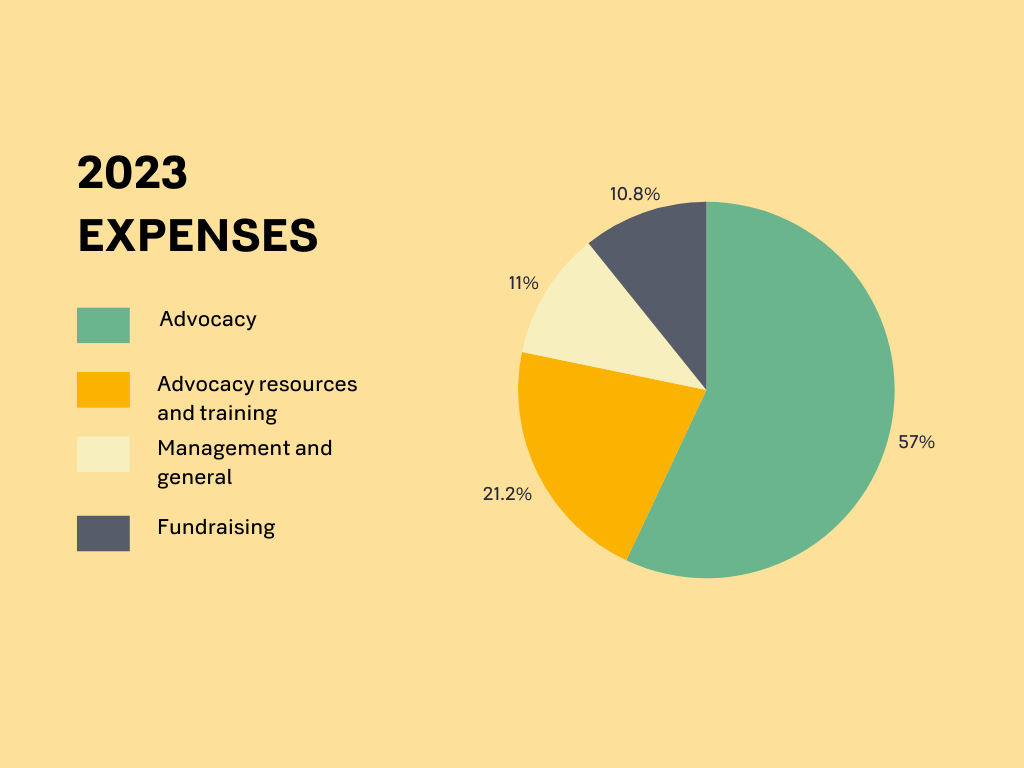
We can’t do this work alone. With your support we can continue the fight for racial and economic justice. Make a difference today.